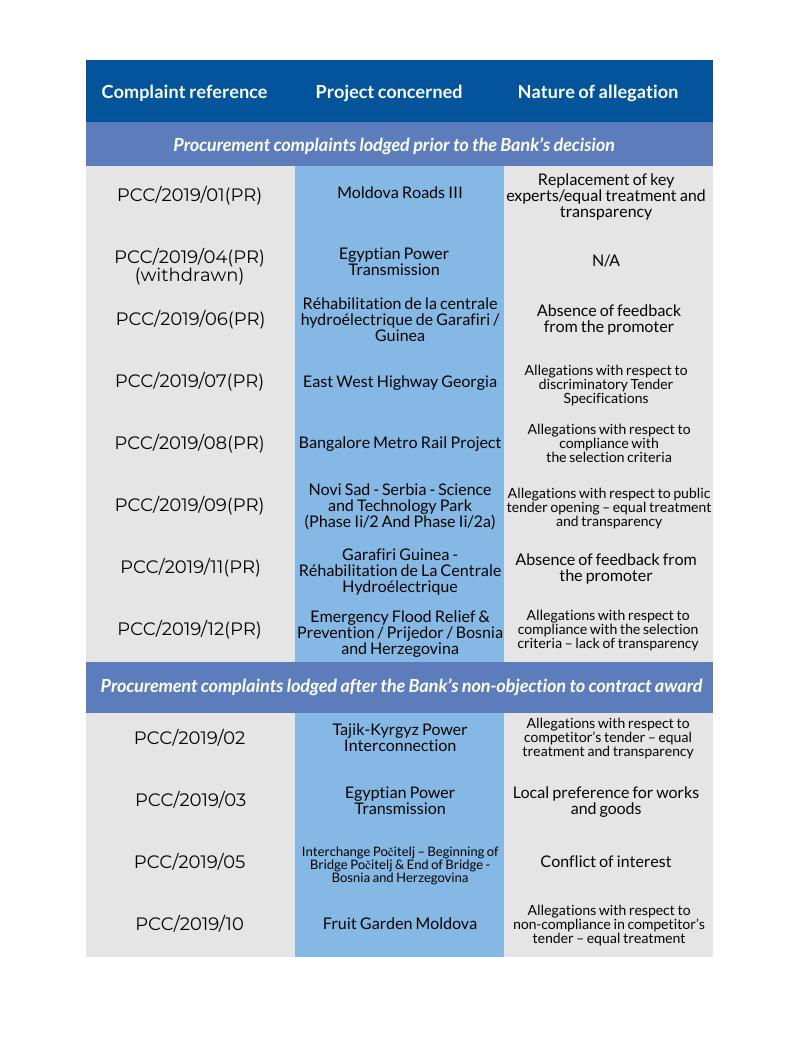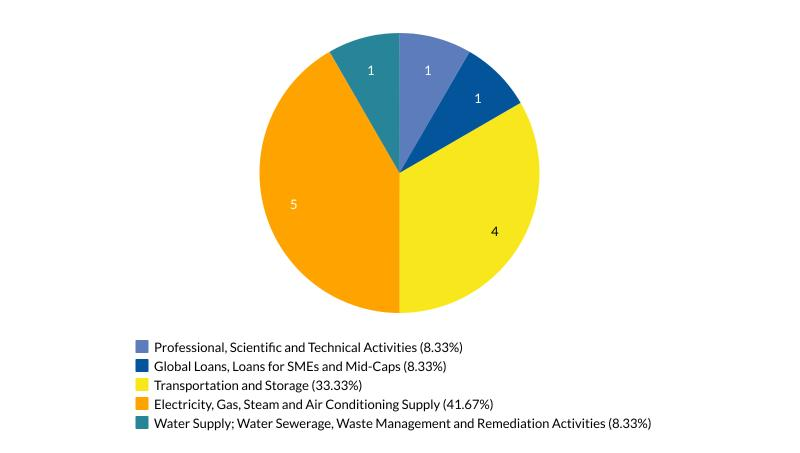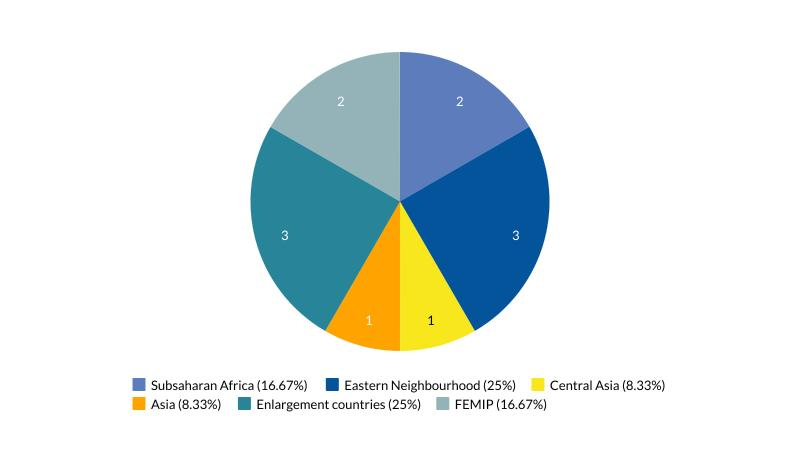This report provides an overview of the procurement complaints received and handled in the course of 2019, of the work of the PCC and of its secretariat. It is the first report compiled and published on PCC’s activity since the establishment of this Committee in late 2018.
1. Introduction
This report, prepared by the Secretariat of the Procurement Complaints Committee (PCC) of the European Investment Bank (EIB), provides an overview of the procurement complaints received and handled in the course of 2019, and of the work of the PCC and its Secretariat. It is the first report compiled and published on the PCC’s activity since the establishment of this Committee in late 2018.
Following the approval of the revised EIB Group Complaints Mechanism Policy and in line with good practices of other International Financial Institutions (IFIs), project-related procurement complaints submitted to the EIB are handled through a separate procedure as of November 2018. Accordingly, the EIB’s Management Committee (MC) established the Procurement Complaints Committee (PCC), a dedicated, independent and impartial Committee, mandated to handle procurement complaints that challenge the Bank’s decision on project procurement procedures under an EIB-financed loan. This system ensures that the Bank handles project procurement complaints regarding EIB-financed projects effectively and independently. If the complainant is not satisfied with the Bank’s outcome, or response, it is entitled to escalate its complaint to the European Ombudsman for alleged maladministration by the Bank.
2. Overview of the PCC’s remit, work and composition
Projects financed by the EIB are bound to follow the Bank’s “Guide to Procurement for projects financed by the EIB”, which was recently updated to include, amongst other subjects, the new procurement complaints regime. Promoters are fully responsible for implementing projects financed by the Bank, and in particular all aspects of the procurement process, from drafting tender documents and awarding contracts through to implementing contracts. The involvement of the Bank is confined solely to verifying whether or not the conditions attached to its financing are met. To that effect, the Bank uses a “non-objection” device for approving procurement methods and outcomes for non-EU country projects financed by the EIB.
The Guide of September 2018 is available at:
https://www.eib.org/en/publications/guide-to-procurement
For projects financed by the Bank within the EU it is the relevant national remedy mechanisms which provide appropriate safeguards, as all EU Member States are bound to implement EU procurement law and the Remedies Directives, which set minimum national review standards.
For more information see:
Complainants lodging procurement complaints may be “any party having or having had an interest in obtaining a particular contract and who has been or risks being harmed by an alleged infringement of the EIB’s Guide to Procurement”. Complainants thus have the possibility of questioning a decision taken by the Bank (usually a non-objection given by the Bank) for project procurement procedures financed under an EIB loan. The PCC may either decide to confirm or withdraw the non-objection already issued by the Bank. In the latter case, the Committee may also recommend to exclude the project component from the financing of the Bank, and/or to undertake any other contractual remedies.
The PCC is an internal Bank Committee with four voting members consisting of senior representatives of operational and non-operational directorates of the Bank. The PCC is chaired by the EIB’s Inspector General and assisted by a small Secretariat. The PCC’s Chairperson decides upon the admissibility of procurement complaints, is in charge of directing and facilitating the work of the PCC and oversees the PCC’s Secretariat.
3. Procurement Complaints
As mentioned in section 2. above, the Bank’s Guide to Procurement requires that the project promoters review, take the necessary actions and respond in a timely manner to complaints addressed to them related to the procurement process for an EIB-financed contract.
An important feature of the procurement complaints system is that the Bank requires the project promoters to observe standstill periods that is, an intervening period of time between the decision to issue a non-objection to the procurement award and the signature of the contract.
Any member of the public may refer a complaint to the EIB in respect of an alleged instance of maladministration in the Bank’s procurement due diligence. The Bank’s Procurement Complaints Committee reviews the Bank's position in respect of complaints arising from tendering of EIB-financed contracts for goods, works and consultancy services in the event that a complaint against the Bank’s action has been received. As mentioned in the introduction to this report, if the complainant is not satisfied with the Bank’s outcome, or response, it is entitled to escalate its complaint to the European Ombudsman for alleged maladministration by the Bank.
a. Taxonomy of admissible procurement complaints and corresponding processes
As described in the Guide to Procurement [1], procurement complaints that challenge the Bank’s decision on project procurement procedures under an EIB-financed loan are classified and handled as follows:
i. Procurement complaints lodged prior to the Bank’s decision (objection or non-objection)
The PCC’s Secretariat examines the complaint following input by the Bank’s Procurement Office in the Projects Directorate (PJ/PO) on the state of play of the procurement procedure concerned. Once the PCC’s Secretariat has confirmed that the complaint has been lodged prior to the Bank’s decision, it is redirected by the PCC’s Secretariat to the Bank’s services in charge of the respective projects for further follow-up. The substance of such complaints is considered when the Bank decides whether to provide its non-objection to the contract award. The unique filing number assigned by the PCC’s Secretariat for this type of complaint includes the abbreviation “PR”, which indicates that the complaint was lodged prior to the Bank’s decision.
ii. Procurement complaints lodged after the Bank’s non-objection to contract award and prior to the signature of contracts
Complaints submitted after the Bank has provided its non-objection to the contract award and during the standstill period are reviewed by the Procurement Complaints Committee, which examines the case to enable the Bank to take a final position as to whether to confirm or withdraw the non-objection issued by the Bank. The submission of this type of complaint triggers the suspension of the Bank’s non-objection until the PCC has completed its review. Considering that the Bank is not a party to the procurement contract, it can only take decisions concerning the financing it provides to a given project or project component.
The Bank’s decision is taken in less than 30 calendar days from the submission of the complaint. In complex cases, this deadline may be extended up to 60 calendar days.
iii. Procurement complaints lodged following the Bank’s non-objection to contract award and after the signature of contracts.
For complaints received after the standstill period has expired and the respective procurement contracts have been signed, the PCC can no longer redress the procurement procedure. However, the PCC still examines such otherwise admissible complaints, to decide whether the Bank should confirm or withdraw its financing of the contract.
b. Number of PCC complaints filed during 2019 overall and by type
In the course of 2019, the PCC received 12 procurement complaints. Of these, seven were procurement complaints submitted prior to the Bank’s decision/non-objection. Accordingly, these complaints were redirected by the PCC’s Secretariat to the Bank’s services in charge of the respective projects for further follow-up as per the Guide to Procurement. One complainant withdrew their complaint following further clarifications that had been provided by the PCC’s Secretariat.
The PCC’s Secretariat received the remaining four procurement complaints following the Bank’s non-objection to contract award; as such, these were reviewed and decided upon by the PCC. Two out of these four procurement complaints were submitted after the signature of the respective procurement contracts. The PCC voted to uphold the Bank’s non-objection for three out of these four complaints and to withdraw the Bank’s non-objection in one case.
i. PCC complaints filed during 2019 by concerns raised by the complainants

ii. PCC Complaints by project business sector
The following table depicts a distribution of the categories of projects
subject to procurement complaints by business sector.

The following table depicts a distribution of the categories of projects
subject to procurement complaints by region of operation.

[1] Letter C of Annex 8 (Procurement Complaints Procedures)
of the Guide to Procurement for projects financed by the EIB.
4. PCC Secretariat’s observations following the first full year of the Committee’s operation
Most procurement complaints are submitted prior to the Bank’s decision (non-objection), as per the table in section 3.b.i in this report. In qualitative terms, and whilst complaints do not typically revolve around a specific issue, the reasons were unequal treatment, flawed technical evaluation or selection, conflict of interest and allegations in relation to local preference policies.
Procurement complaints originate from different regions of the world as far as the project countries are concerned; the complainants have also been quite diverse in terms of nationality/country of origin.
The response time for procurement complaints lodged after the Bank’s non-objection to contract award and prior to the signature of contracts is in line with the Bank’s policy (Annex 8 to the Guide to Procurement for projects financed by the EIB). Complainants received the PCC’s reply and decision in a time-efficient manner and in less than 60 days with one exception only (in the case of a complaint which was received during the summer break).
Complainants seem to be satisfied with the PCC’s decisions, answers and reasoning as no complainant has thus far escalated their complaint to the European Ombudsman for alleged maladministration by the Bank following the PCC’s decision and answers.
It seems that interested parties know how to approach the PCC: this conclusion is sustained by the number of procurement complaints received, which is similar to the number of procurement complaints received by CM in the years preceding the PCC’s creation. Some complaints, however, were received by the PCC’s Secretariat through different channels, which may indicate that the existence of the dedicated PCC mailbox is not known to all complainants. This is an issue to consider when designing and implementing the Committee’s outreach in the course of 2020.
The PCC’s Secretariat receives a number of emails which are not necessarily related to project procurement at the EIB but may present issues falling within the mandates of the Investigations Division (IG/IN) or the Complaints Mechanism (IG/CM). The PCC’s Secretariat’s position within the Inspectorate General has facilitated communication and exchange of information as well as the transfer of complaints to IG/IN concerning fraud and IG/CM for complaints regarding maladministration.
The PCC’s Secretariat also receives and replies to emails/general inquiries about the PCC including its purpose, authority, applicability and administration of the Committee (e.g. by researchers or other parties interested in forums and mechanisms available to tenderers seeking to challenge the award of a public contract or otherwise complain about procurement procedures).
5. PCC Secretariat’s outreach and activity outlook for 2020
The PCC’s Secretariat plans a number of actions drawing on lessons learnt during the first full year of the PCC’s operation.
Data protection issues in the context of the activity of the PCC and the PCC’s Secretariat are currently assessed in close cooperation with the Bank’s Data Protection Officer, ensuring that the PCC’s overall operation is fully aligned with EU law and best practice.
In light of the fact that the PCC is a new Committee, the Secretariat plans to engage more systematically with colleagues and stakeholders, aiming to make them aware of the new procurement complaints system at the EIB and its benefits. With respect to outreach, the PCC’s Secretariat plans to make the presence and existence of the PCC more visible on the Bank’s website.
Finally, the PCC’s Secretariat plans to compile all existing material and official documents relating to the PCC and centralise all practical processing and internal communication requirements and practices relating to the Committee’s operation.
February 2020
